Malcolm R. Campbell's Blog, page 15
December 16, 2023
Dispatch from the Nut House
“Being an author is being in charge of your own personal insane asylum.” – Terri Guillemets
 When I worked as a home manager at a developmental disabilities unit of the Illinois Department of Mental Health, people often asked if there was a career path. I told them that we kept advancing up the chain of command until we became patients. The same path exists for writers.
When I worked as a home manager at a developmental disabilities unit of the Illinois Department of Mental Health, people often asked if there was a career path. I told them that we kept advancing up the chain of command until we became patients. The same path exists for writers.
As CEO and patient, you’re in charge of your own delusions and treatment plan and the novels you write while a patient.
As CEO, I have banned all shock treatments as well as any purported “caregiver” named Mildred Ratched. For the reasons why, see the movie “One Flew Over the Cuckoo’s Nest.” Shock treatments and Nurse Ratched are placed in our fiction to relight our readers.
 While based on APA clinical practice guidelines, hospital treatment protocols vary depending on age, types of voices heard, and the persistence of hallucinations when manuscripts are set aside for the day. And yet, when all is written and done, the writer can only be discharged when s/he stops writing often with the assistance of Alprazolam 0.25 mg PRN.
While based on APA clinical practice guidelines, hospital treatment protocols vary depending on age, types of voices heard, and the persistence of hallucinations when manuscripts are set aside for the day. And yet, when all is written and done, the writer can only be discharged when s/he stops writing often with the assistance of Alprazolam 0.25 mg PRN.
Living in the nut house is standard practice for a writer, yet in describing it, I don’t mean to belittle proper psychological and/or psychiatric treatments for those who need help! My premise is that all writers need help and that that need is a side effect of the career. I agree with Dorothy Parker’s prescription: “If you have any young friends who aspire to become writers, the second greatest favor you can do them is to present them with copies of ‘The Elements of Style.’ The first greatest, of course, is to shoot them now, while they’re happy.”
 Looks innoce
nt, doesn’t it?
Looks innoce
nt, doesn’t it?Writers create worlds. But they’re not powerful enough to become gods. The strain is just too much. Hence, creating worlds often leads to the nut house, i.e. the Bellevue in their neighborhood. At best, the creation of worlds and characters is an exciting roller coaster ride. At worst, it’s a flight over the cuckoo’s nest. Either way, the trip might be an illusion.
Here at the nut house, we get “three squares a day,” access to the best Jungian therapists, and a warm bed to sleep in. Yes, there are bars on the windows and doors and visitors are limited, but that’s all for our protection–or so they say.
If you’re a reader, no need to worry. We’re behind these bars for you and, I guess, because living this way is all we know.
Malcolm R. Campbell writes magical realism, paranormal, and contemporary fantasy stories and novels.
December 15, 2023
‘Voices in the Dark,’ by J. P. Telotte
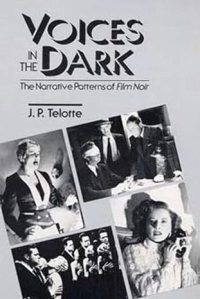 Jay Telotte and I were members of the faculty of the Department of English of a small Georgia college. His great love was film, a focus that turned into a career when he later became an expert in the field with multiple books, honors, and articles, and is now professor emeritus at the Georgia Tech School of Literature, Media, and Communication. We did not agree about Katherine Hepburn, and Meryl Streep, or coffee with chicory. And yet, eating dinner at his house always included a film shown on an old-fashioned projector. He liked films like “Juliet of the Spirits” and turned me into a believer in Federico Fellini’s work.
Jay Telotte and I were members of the faculty of the Department of English of a small Georgia college. His great love was film, a focus that turned into a career when he later became an expert in the field with multiple books, honors, and articles, and is now professor emeritus at the Georgia Tech School of Literature, Media, and Communication. We did not agree about Katherine Hepburn, and Meryl Streep, or coffee with chicory. And yet, eating dinner at his house always included a film shown on an old-fashioned projector. He liked films like “Juliet of the Spirits” and turned me into a believer in Federico Fellini’s work.
We also liked film noir, perhaps my favorite film genre, so I was pleased when he wrote Voices in the Dark: The Narrative Patterns of Film Noir in 1989. We had both moved on to other positions when the book came out, so I never got a chance to ask him why he didn’t enlarge it to include neo-noir. His wife, Leigh, who was an English teacher, switched over to computer documentation–as did I–and we both ended up briefly working in the same department at Hewlett-Packard in Atlanta. (She was on staff and I was a contract writer.) Later, Leigh Ehlers Telotte wrote several books, including Victoria, Queen of the Screen: From Silent Cinema to New Media.
From the Publisher
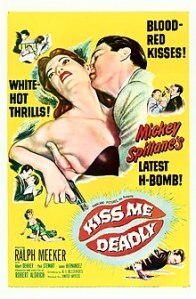 The American film noir, the popular genre that focused on urban crime and corruption in the 1940s and 1950s, exhibits the greatest amount of narrative experimentation in the modern American cinema. Spurred by postwar disillusionment, cold war anxieties, and changing social circumstances, these films revealed the dark side of American life and , in doing so, created unique narrative structures in order to speak of that darkness. J.P. Telotte’s in-depth discussion of classic films noir–including The Lady from Shanghai, The Lady in the Lake, Dark Passage, Double Indemnity, Kiss Me Deadly, and Murder, My Sweet–draws on the work of Michel Foucault to examine four dominant noir narrative strategies.
The American film noir, the popular genre that focused on urban crime and corruption in the 1940s and 1950s, exhibits the greatest amount of narrative experimentation in the modern American cinema. Spurred by postwar disillusionment, cold war anxieties, and changing social circumstances, these films revealed the dark side of American life and , in doing so, created unique narrative structures in order to speak of that darkness. J.P. Telotte’s in-depth discussion of classic films noir–including The Lady from Shanghai, The Lady in the Lake, Dark Passage, Double Indemnity, Kiss Me Deadly, and Murder, My Sweet–draws on the work of Michel Foucault to examine four dominant noir narrative strategies.
The book is very readable and is a wonderful introduction to noir films, many of which you can see on Turner Classic Movies in their noir alley segment. I learned a lot about film from Jay and wished we had moved in the same circles after moving to the Atlanta area.
–Malcolm
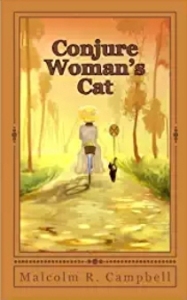 Malcolm R. Campbell is the author of magical realism novels set in Florida.
Malcolm R. Campbell is the author of magical realism novels set in Florida.
December 14, 2023
Remembering ‘The Summer of ’42’ by Herman Raucher
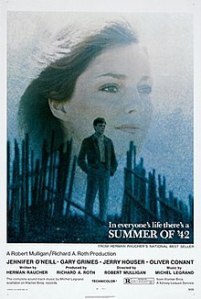 This bitter-sweet movie written by Herman Raucher based on his memoir scored big at the box office when it appeared in 1971 and became quite a sensation with young men who wished the film had been about them: teenager meets a grieving war widow and they end up in bed.
This bitter-sweet movie written by Herman Raucher based on his memoir scored big at the box office when it appeared in 1971 and became quite a sensation with young men who wished the film had been about them: teenager meets a grieving war widow and they end up in bed.
Some critics like Roger Ebert didn’t like the sentimentality. According to Wikipedia, “Vincent Canby of The New York Times expressed that Hermie’s encounter with Dorothy is ‘a good deal more common in novels and screenplays (and in the Hermie-like fantasies of middle-aged writers) than in real life’, but praised the film’s ‘reticent quality of its romanticism’ and its actors. Canby concluded the ‘foreground is mostly accurate, in which sexual panic and fist fights and nose bleeds are treated with the great comic respect they deserve.'” The tone of the movie was greatly enhanced by Michel Legrand’s score which won an Oscar.
I read the book, saw the movie, and liked both. I liked them because the story was well told and because–as Vincent Canby noted–meeting “Dorothy” was a prospective rite of passage that seldom happened, and ended badly if it did happen, though these realities didn’t stop numerous young men from dreaming and fantasizing about such an encounter. Freudian psychiatrists probably have a lot to say about such fantasies.
From the Book Publisher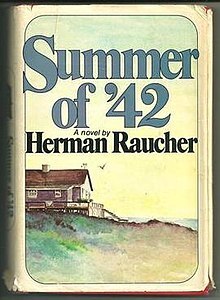 “A chronicle of one summer in a boy’s coming of age”—the international bestselling classic that became the basis for the Oscar-winning film (Medium).
“A chronicle of one summer in a boy’s coming of age”—the international bestselling classic that became the basis for the Oscar-winning film (Medium).
“Captivating and evocative, Herman Raucher’s semi-autobiographical tale has been made into a record-breaking Academy Award-winning hit movie, adapted for the stage, and enchanted readers for generations.
“In the summer of 1942, Hermie is fifteen. He is wildly obsessed with sex, and passionately in love with an “older woman” of twenty-two, whose husband is overseas and at war. Ambling through Nantucket Island with his friends, Hermie’s indelible narration chronicles his frantic efforts to become a man, especially one worthy of the lovely Dorothy, as well as his glorious and heartbreaking initiation into sex.”
from the Reviewers Website photo
Website photo
“Mr. Raucher scores most tellingly. His recall of nervous teen-age gaucheries is dead accurate, hilarious, tinged with sadness.”—The New York Times Book Review
“A charming and tender novel . . . The overall effect is one of high hilarity. Raucher is a comic-artist who is able to convey the fears and joys . . . of the boy and at the same time give older readers a wrench in the heart. ”—Publishers Weekly
December 13, 2023
When ‘I’m Sorry’ is a putdown
 Why is it that otherwise polite people (who are introduced as close friends) by relatives who live outside the South find it necessary to say with a perfectly straight face “I’m sorry” when we say we’re from Georgia? If they weren’t friends of my relatives, I could respond in all kinds of ways.
Why is it that otherwise polite people (who are introduced as close friends) by relatives who live outside the South find it necessary to say with a perfectly straight face “I’m sorry” when we say we’re from Georgia? If they weren’t friends of my relatives, I could respond in all kinds of ways.
The best I can say is, “We love it there.” Or, “We were born lucky, I guess.”
And yet, they say it with such progressive guile as though we’re living in hell and that’s how God rolled the dice.
 My wife, I think, wants to slap the shit out of these people. I understand that because she was born here in Georgia very near where we now live. I was born in California and lived in Oregon, New York, Illinois, and Pennsylvania before settling in Georgia. The “I’m sorry” people don’t know any of this and if they did, it wouldn’t matter, because they’re living life looking for an excuse to say nasty things about Southerners.
My wife, I think, wants to slap the shit out of these people. I understand that because she was born here in Georgia very near where we now live. I was born in California and lived in Oregon, New York, Illinois, and Pennsylvania before settling in Georgia. The “I’m sorry” people don’t know any of this and if they did, it wouldn’t matter, because they’re living life looking for an excuse to say nasty things about Southerners.
I feel like pointing out to those who live in Maryland that their state was a slave state because I don’t think they know that. Yes, the South has a lot to atone for but Maryland’s sins are not on our to-do list.
When I was a kid, of often heard, “Save your Confederate money because the South’s going to rise again.” That’s pure BS. And all of us who live here don’t subscribe to that BS. Never did. So now I think time has moved far enough away from the Civil War to put away sniping between the regions. That’s kid stuff and outside what the country is trying to achieve through unity.
“I’m sorry,” you say. Ha, I bet you’re not.
–Malcolm
December 11, 2023
Congress should pass a law that mandates more novels from non-prolific authors
And why not? The feds are already sticking their noses into a lot of stuff that isn’t the government’s business. And if Congress were fair about the matter, it wouldn’t force everyone to churn out books like James Patterson who, as we all know, has a truckload of co-authors except on his Alex Cross novels.
 Clarke has aged since this 2006 photo was taken.
Clarke has aged since this 2006 photo was taken.Since the idea for this legislation is mine, I get to choose the authors: they would include Mark Helprin, Erin Morgenstern, Susanna Clarke, and Donna Tartt. Oh shoot, Clarke has chronic fatigue syndrome, so we can’t put her on the list. We want to, but we shouldn’t. While it’s taxing to write books, maybe the feds should impose a tax on authors who really ought to write more, the rationale being that we need their stories to stay sane–or mostly sane.
Jonathan Strange and Mr. Norrell (2004) and its alternate history of Britain and magic, is probably one of the best magic/fantasy novels anyone has written. We need more, much more because these books show us the world as it really exists. Perhaps Congress can convene a committee of dunces to learn why there’s been no sequel.
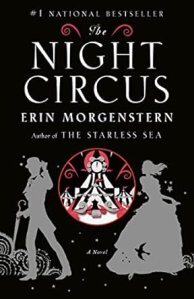 One pleasant surprise of 2012 was the appearance (without warning) of Morgenstern’s The Night Circus about a strange circus that appears without warning and spreads magic and humor in the towns where it manifests. The Starless Sea (2020) also captured our imagination with a magical world just as stunning as that of the circus.
One pleasant surprise of 2012 was the appearance (without warning) of Morgenstern’s The Night Circus about a strange circus that appears without warning and spreads magic and humor in the towns where it manifests. The Starless Sea (2020) also captured our imagination with a magical world just as stunning as that of the circus.
Perhaps the tactic Congress should take is that readers need more of these books for national security reasons. We know that rationale is always bullshit, but it seems to work.
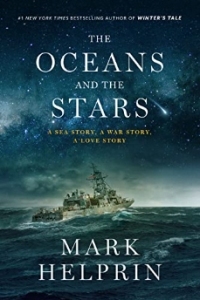 Mark Helprin, at 76, has appeared with another novel that will help save us from the Ruskies, Hamas, and other bad people called The Oceans and the Stars. I like all of his work, but think nothing holds a candle to Winter’s Tale.
Mark Helprin, at 76, has appeared with another novel that will help save us from the Ruskies, Hamas, and other bad people called The Oceans and the Stars. I like all of his work, but think nothing holds a candle to Winter’s Tale.
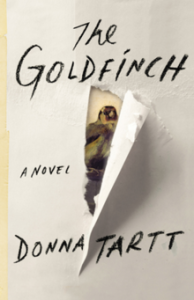 Donna Tartt who–thank the good Lord is only 59–has always written at a snail’s pace. Congress can fix this because the country, as the Department of Homeland Security would say, “needs the security of books,” and that means that Tartt cannot take a few years off to play video games or watch “Survivor” and “Hells Kitchen” while the Pulitzer gathers dust on the shelves.
Donna Tartt who–thank the good Lord is only 59–has always written at a snail’s pace. Congress can fix this because the country, as the Department of Homeland Security would say, “needs the security of books,” and that means that Tartt cannot take a few years off to play video games or watch “Survivor” and “Hells Kitchen” while the Pulitzer gathers dust on the shelves.
We need the stories, but we wither on the vine when we’re stuck waiting for them for too long.
–Malcolm
December 10, 2023
People who read
“You get a little moody sometimes but I think that’s because you like to read. People that like to read are always a little fucked up.” ― Pat Conroy, The Prince of Tides
 I believe this because I read and I am f_cked up. If you read, you probably are, too.
I believe this because I read and I am f_cked up. If you read, you probably are, too.
Or perhaps, Pat Conroy said that in a novel because he wrote novels about people who were f_cked up, and/or he had to be f_cked up to write such novels. It’s a chicken and egg thing, whether reading f_cks you up or attaches itself to people who are already f_cked up.
The readers and writers who irritate me are the ones who don’t know they’re f_cked up or, worse yet, act like everyone on the planet except them is a jerk one way or another.
It comes down to this: being a writer does not make one a god and being a reader does not make one an angel. Those who think so, love calling attention to themselves as the pretentious arbiters of high-quality knowledge, taste, “proper” political agendas, and tantric orgasms. If they are writers, they have–or want to have–an MFA degree even though an MFA kills more writers than it nurtures. If they are readers, they think it’s important to argue about how many angels can dance on the head of a pin.
If there were a collective noun that suited the worst of readers, it would be a pretension of readers. The same noun might apply to the worst of our writers.
There’s nothing wrong with becoming an avid reader or a prolific writer if you don’t brag about it or openly proclaim that it puts you at the head of the line when the rapture comes. Those of us who write and/or read need to understand in spades that we’re not special, nor better than anyone who drives a garbage truck or labors as a longshoreman.
Readers who are f_cked up think they are God’s gift to the unwashed and that the rest of us need to treat them as such. You know the kind of people I’m talking about, right?
–Malcolm
December 9, 2023
Goodbye Ryan O’Neal at 82 whom I remember best for ‘Paper Moon’and ‘Barry Lyndon,’ but not so much for ‘Love Story’
 O’Neal in 1968
O’Neal in 1968
I also remember his recurring role on “Bones” as Temperance Brennan’s somewhat ne’er-do-well father Max. Since I watch re-runs of “Bones ” I still see Ryan O’Neal a lot. He made a nice foil for the ultra-logical Brennan and the always-suspicious FBI agent Booth.
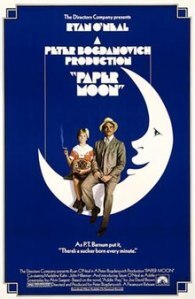 I was a huge fan of the 1973 comedy-drama film directed by Peter Bogdanovich and starring Ryan and his daughter Tatum who won a best supporting actress Oscar for the work in the film.
I was a huge fan of the 1973 comedy-drama film directed by Peter Bogdanovich and starring Ryan and his daughter Tatum who won a best supporting actress Oscar for the work in the film.
According to the critics, “Vincent Canby of The New York Times praised “two first-class performances” from Ryan and Tatum O’Neal but found the film “oddly depressing” and unable to “make up its mind whether it wants to be an instant antique or a comment on one”. Roger Ebert gave the film his top four-star rating and commented that “a genre movie about a con man and a little girl is teamed up with the real poverty and desperation of Kansas and Missouri, circa 1936. You wouldn’t think the two approaches would fit together, somehow, but, they do, and the movie comes off as more honest and affecting than if Bogdanovich had simply paid tribute to older style.” Gene Siskel gave the film three-and-a-half stars out of four and wrote that Tatum O’Neal “is more than cute. Her role is something special in the well-established tradition of children on film.” I don’t agree that the film was “oddly depressing.”
According to Variety, “O’Neal was diagnosed with chronic leukemia in 2001 and with prostate cancer in 2012.” And noted that he was a “marquee draw” in the 1970s.
 Part of that draw came from “Love Story” (1970). The film earned a lot of money though it was much maligned for being a shameless tear-jerker. O’Neal and Candace Bergen starred in the 1978 sequel “Oliver’s Story.” I preferred “Barry Lyndon,” Stanley Kubrick’s 1975 historical drama that was drawn from William Makepeace Thackeray’s 1844-era novel The Luck of Barry Lyndon. The film received Oscar nominations and was notable for its cinematography.
Part of that draw came from “Love Story” (1970). The film earned a lot of money though it was much maligned for being a shameless tear-jerker. O’Neal and Candace Bergen starred in the 1978 sequel “Oliver’s Story.” I preferred “Barry Lyndon,” Stanley Kubrick’s 1975 historical drama that was drawn from William Makepeace Thackeray’s 1844-era novel The Luck of Barry Lyndon. The film received Oscar nominations and was notable for its cinematography.
So, we lost another journeyman actor whose work spanned many decades and genres from “Peyton Place” and beyond.
–Malcolm
December 8, 2023
I have a new respect for those forced to be on gluten-free diets
I was initially skeptical of the rush by so many people to remove gluten from their diets. On one hand, it’s part of a new diet fad. For another, going gluten-free makes meals more expensive while taking away nutrients required for a balanced diet.
 But then when I was tested to see if I had Celiac disease as part of this many-month-long attempt by doctors to find out what was causing my apparent stomach infection, I was happy to see that I don’t have the disease. For one thing, there’s no cure except for getting rid of gluten. For another, if I had a Celiac problem and went on a gluten-free diet immediately, it might take a couple of years to feel the results.
But then when I was tested to see if I had Celiac disease as part of this many-month-long attempt by doctors to find out what was causing my apparent stomach infection, I was happy to see that I don’t have the disease. For one thing, there’s no cure except for getting rid of gluten. For another, if I had a Celiac problem and went on a gluten-free diet immediately, it might take a couple of years to feel the results.
Having to monitor my food for any trace of gluten–often from unexpected sources–would drive me nuts–like monitoring my diet for any trace of nuts. The people who have to keep either out of their diets have enough trouble with planning meals and looking at ingredients in processed foods, much less the miserable experience at a restaurant where servers often have no idea whether the “bad stuff” is in the food or not.
As I waited for the results of the test, I thought about all the consequences of having Celiac and turning into one of those people who has to look at everything they eat through a microscope. I’ve always been able to eat almost anything, so being about to eat a small portion of that anything would have been quite a chore.
Due to the workings of Murphy’s law, developing a pill to combat the negative impact of gluten for those who shouldn’t have it, the result would probably be something bad. Lactaid seems to work but if a product called Gluteaide came along, the side effects would probably be fatal–or worse.
I tried Lactaid (just in case) and nothing bad happened. Yet I always worry that there’s a catcher in the rye–in addition to the gluten.
–Malcolm
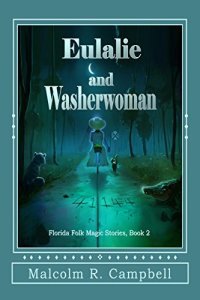 Malcolm R. Campbell is the author of magical realism novels set in the Florida Panhandle.
Malcolm R. Campbell is the author of magical realism novels set in the Florida Panhandle.
December 7, 2023
It’s time to re-read Pat Conroy’s ‘Prince of Tides’
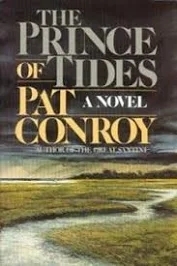 Along with Gibbon’s A Scots Quair and Allende’s The House of Spirits, Pat Conroy’s The Prince of Tides (1986) is one of those “comfort food” books that I return to again and again even though it tells the story of a doomed family with some the worst personal events ever consigned to print. Most readers, I think, need “comfort food” books not for the comfort they provide but for familiar stories, beautifully told.
Along with Gibbon’s A Scots Quair and Allende’s The House of Spirits, Pat Conroy’s The Prince of Tides (1986) is one of those “comfort food” books that I return to again and again even though it tells the story of a doomed family with some the worst personal events ever consigned to print. Most readers, I think, need “comfort food” books not for the comfort they provide but for familiar stories, beautifully told.
I suppose most readers are more familiar with The Great Santini and The Lords of Discipline, in part because their stories are more straightforward and the movies were better made. I like all of Conroy’s work but come back to The Prince of Tides because the story is a poem to the South Carolina low country and the flaws of a Southern upbringing of the era in which the book was set.
I grew up in the South along the Florida coast, and I am familiar with the beauty of marshland, tides, fishing, coastal waters, and what Southern society “did wrong,” so I know the tropes typically found in Southern fiction set in the 1950s and 1960s. When I read The Prince of Tides, I see where I came from without the worst of times that confront the Wingo family.
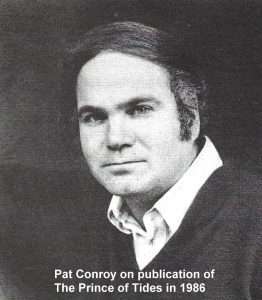 Conroy in 1986
Conroy in 1986
The San Francisco Chronicle wrote, “A big, sprawling saga of a novel this epic family drama is a masterwork by the #1 New York Times bestselling author of The Great Santini.” Some reviewers would say the book is overwritten and/or that most of Conroy’s work is overwritten. Perhaps so, but I don’t care because the settings and circumstances almost demand that his novels should be overwritten.
From the Publisher“Set in New York City and the low country of South Carolina, The Prince of Tides opens when Tom, a high school football coach whose marriage and career are crumbling, flies from South Carolina to New York after learning of his twin sister’s suicide attempt. Savannah is one of the most gifted poets of her generation, and both the cadenced beauty of her art and the jumbled cries of her illness are clues to the too-long-hidden story of her wounded family. In the paneled offices and luxurious restaurants of New York City, Tom and Susan Lowenstein, Savannah’s psychiatrist, unravel a history of violence, abandonment, commitment, and love. And Tom realizes that trying to save his sister is perhaps his last chance to save himself.
“With passion and a rare gift of language, Pat Conroy moves from present to past, tracing the amazing history of the Wingos from World War II through the final days of the war in Vietnam and into the 1980s, drawing a rich range of characters: the lovable, crazy Mr. Fruit, who for decades has wordlessly directed traffic at the same intersection in the southern town of Colleton; Reese Newbury, the ruthless, patrician land speculator who threatens the Wingos’ only secure worldly possession, Melrose Island; Herbert Woodruff, Susan Lowenstein’s husband, a world-famous violinist; Tolitha Wingo, Savannah’s mentor and eccentric grandmother, the first real feminist in the Wingo family.
“Pat Conroy reveals the lives of his characters with surpassing depth and power, capturing the vanishing beauty of the South Carolina low country and a lost way of life.”
According to Publishers Weekly, the book is, “A seductive narrative, told with bravado, flourishes, portentous foreshadowing, sardonic humor and eloquent turns of phrase. … For sheer storytelling finesse, Conroy will have few rivals.”
As I re-read this familiar novel, I am sick with an infection of unknown origin that I contracted in June and that still has doctors perplexed. Plenty of tests, but no answers. The story fits my mood as I wonder whether or not at my age I can survive this illness. This is why we need comfort books. They help us remain sane because they present greater insanities than we can endure.
–Malcolm
December 5, 2023
Scheherazade
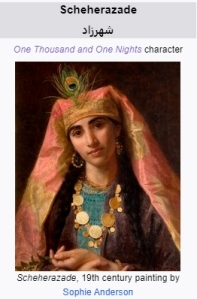 Scheherazade, the teller of the tales in The Book of the Thousand Nights and a Night, captured my imagination when I was in junior high school. The stories are fascinating. So was the idea of the narrator telling one story per night–but never quite ending it–to keep the king from killing her when a tale ends which he had threatened to do. Or perhaps it was her name that drew me in and never let me go.
Scheherazade, the teller of the tales in The Book of the Thousand Nights and a Night, captured my imagination when I was in junior high school. The stories are fascinating. So was the idea of the narrator telling one story per night–but never quite ending it–to keep the king from killing her when a tale ends which he had threatened to do. Or perhaps it was her name that drew me in and never let me go.
My parents are at fault because they gave me a copy of the book as a gift for Christmas or my birthday. It’s around here somewhere. Suffice it to say, it wasn’t the definitive 1880s translation from Richard Burton (1821–1890) which filled many volumes and might still be the only complete English translation.
 I also had a copy of Rimsky-Korsakov’s 1888 symphonic suite “Scheherazade” based on the story. I had it on vinyl. It’s also around here somewhere, though I probably wore all the grooves off. My copy is older than the version shown here.
I also had a copy of Rimsky-Korsakov’s 1888 symphonic suite “Scheherazade” based on the story. I had it on vinyl. It’s also around here somewhere, though I probably wore all the grooves off. My copy is older than the version shown here.
I still like the stories now, many years after I first read them, and wonder how many high school and college students study the book anymore. I hope they do, for though it comes from another time, place, and culture, it presents stories that demand our attention and that keeps us reading–rather like the king who fell in love with Sheherazade (sparing her life) while she was telling her stories every night.
from the Publisher (current edition)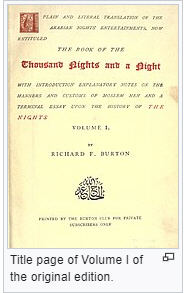 “THE BOOK OF THE Thousand Nights and a Night VOLUME V Translated by RICHARD F. BURTON Limited to one thousand numbered sets 1885 (London “Burton Club” edition), illustrated The Book of the Thousand Nights and a Night (1885), subtitled “A Plain and Literal Translation of the Arabian Nights Entertainments”, is a celebrated English language translation of “One Thousand and One Nights” (the “Arabian Nights”) – a collection of Middle Eastern and South Asian stories and folk tales compiled in Arabic during the Islamic Golden Age (8th−13th centuries) – by the British explorer and Arabist Richard Francis Burton (1821–1890). It stood as the only complete translation of the Macnaghten or Calcutta II edition (Egyptian recension) of the “Arabian Nights” until 2008. “One Thousand and One Nights” (Arabic: كِتَاب أَلْف لَيْلَة وَلَيْلَة kitāb ʾalf layla wa-layla) is a collection of Middle Eastern and South Asian stories and folk tales compiled in Arabic during the Islamic Golden Age. It is often known in English as the Arabian Nights, from the first English language edition (1706), which rendered the title as The Arabian Nights’ Entertainment. The work was collected over many centuries by various authors, translators, and scholars across West, Central, and South Asia and North Africa. The tales themselves trace their roots back to ancient and medieval Arabic, Persian, Mesopotamian, Indian, Jewish and Egyptian folklore and literature. In particular, many tales were originally folk stories from the Caliphate era, while others, especially the frame story, are most probably drawn from the Pahlavi Persian work Hazār Afsān (Persian: هزار افسان, lit. A Thousand Tales) which in turn relied partly on Indian elements. Initial frame story of the ruler Shahryār (from Persian: شهريار, meaning “king” or “sovereign”) and his wife Scheherazade, (from Persian: شهرزاد, possibly meaning “of noble lineage”), and the framing device incorporated throughout the tales themselves. The stories proceed from this original tale; some are framed within other tales, while others begin and end of their own accord. The bulk of the text is in prose, although verse is occasionally used for songs and riddles and to express heightened emotion. Most of the poems are single couplets or quatrains, although some are longer.”
“THE BOOK OF THE Thousand Nights and a Night VOLUME V Translated by RICHARD F. BURTON Limited to one thousand numbered sets 1885 (London “Burton Club” edition), illustrated The Book of the Thousand Nights and a Night (1885), subtitled “A Plain and Literal Translation of the Arabian Nights Entertainments”, is a celebrated English language translation of “One Thousand and One Nights” (the “Arabian Nights”) – a collection of Middle Eastern and South Asian stories and folk tales compiled in Arabic during the Islamic Golden Age (8th−13th centuries) – by the British explorer and Arabist Richard Francis Burton (1821–1890). It stood as the only complete translation of the Macnaghten or Calcutta II edition (Egyptian recension) of the “Arabian Nights” until 2008. “One Thousand and One Nights” (Arabic: كِتَاب أَلْف لَيْلَة وَلَيْلَة kitāb ʾalf layla wa-layla) is a collection of Middle Eastern and South Asian stories and folk tales compiled in Arabic during the Islamic Golden Age. It is often known in English as the Arabian Nights, from the first English language edition (1706), which rendered the title as The Arabian Nights’ Entertainment. The work was collected over many centuries by various authors, translators, and scholars across West, Central, and South Asia and North Africa. The tales themselves trace their roots back to ancient and medieval Arabic, Persian, Mesopotamian, Indian, Jewish and Egyptian folklore and literature. In particular, many tales were originally folk stories from the Caliphate era, while others, especially the frame story, are most probably drawn from the Pahlavi Persian work Hazār Afsān (Persian: هزار افسان, lit. A Thousand Tales) which in turn relied partly on Indian elements. Initial frame story of the ruler Shahryār (from Persian: شهريار, meaning “king” or “sovereign”) and his wife Scheherazade, (from Persian: شهرزاد, possibly meaning “of noble lineage”), and the framing device incorporated throughout the tales themselves. The stories proceed from this original tale; some are framed within other tales, while others begin and end of their own accord. The bulk of the text is in prose, although verse is occasionally used for songs and riddles and to express heightened emotion. Most of the poems are single couplets or quatrains, although some are longer.”
 These stories took me to another world as did the music. Take a look and you might have a similar experience though not with my obsession. I do believe these stories are “must-reading” because they are a strong component of the world’s literary heritage–as are the Shakespeare plays–and demand our attention. That is to say, part of being a multi-genre, multi-cultural, reader is to dip one’s toe (if not more) into the stories spun by Scheherazade and know more of the world outside our neighborhoods.
These stories took me to another world as did the music. Take a look and you might have a similar experience though not with my obsession. I do believe these stories are “must-reading” because they are a strong component of the world’s literary heritage–as are the Shakespeare plays–and demand our attention. That is to say, part of being a multi-genre, multi-cultural, reader is to dip one’s toe (if not more) into the stories spun by Scheherazade and know more of the world outside our neighborhoods.
–Malcolm



